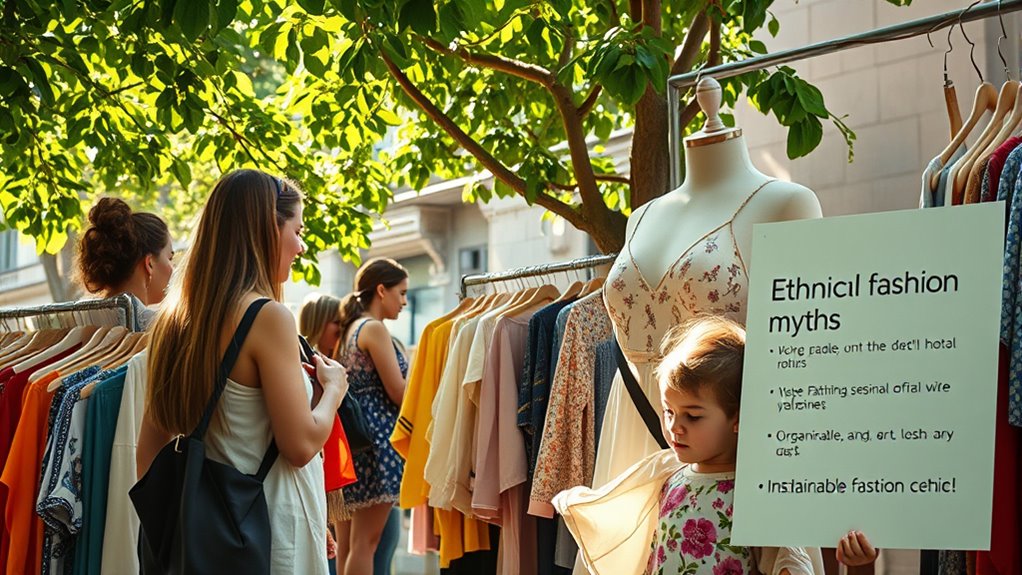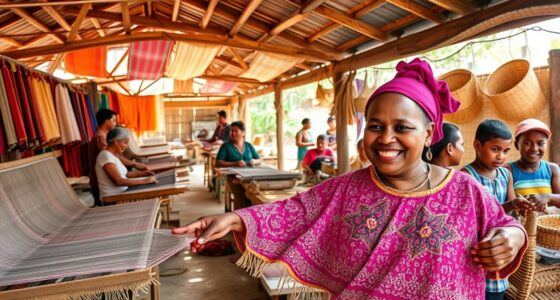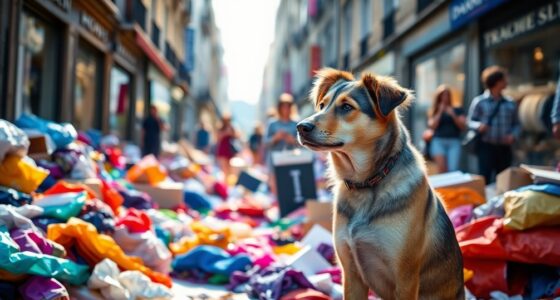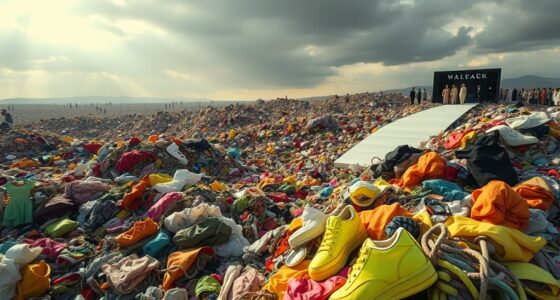Many believe ethical fashion is too expensive, but brands now offer affordable, stylish options using sustainable materials like organic cotton and recycled fabrics. These choices are durable, reducing waste and environmental harm. Ethical companies prioritize fair wages and safe conditions, supporting better labor practices. Contrary to myths, ethical fashion helps build a fairer economy and offers high-quality, long-lasting pieces. Keep exploring to uncover the facts behind these common misconceptions and discover more ways to make stylish, responsible choices.
Key Takeaways
- Ethical fashion is often thought to be prohibitively expensive, but many brands offer affordable, sustainable options.
- Many believe sustainable fabrics lack durability, but eco-friendly materials like organic cotton and recycled fabrics are long-lasting.
- There’s a myth that ethical brands compromise on style; however, they produce trendy, well-designed clothing comparable to fast fashion.
- Some assume transparency in supply chains is rare, yet many ethical brands openly share their sourcing and labor practices.
- It’s commonly believed ethical fashion limits choices, but there’s a wide variety of styles and options that suit different tastes and budgets.
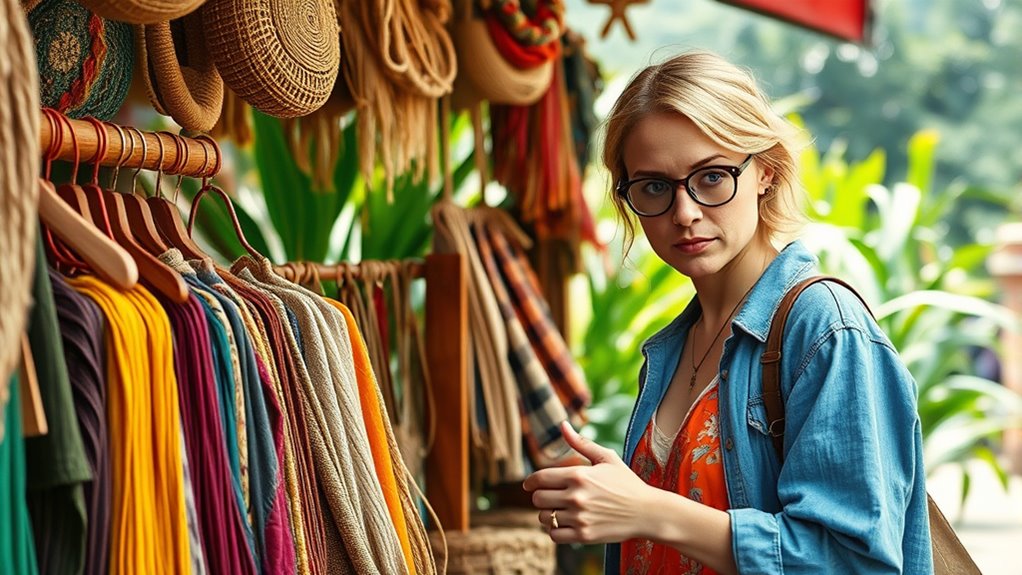
Many people believe that ethical fashion is too expensive or impossible to find, but this isn’t always true. When you explore brands committed to ethical practices, you’ll discover options that balance quality and affordability. One key aspect that makes ethical fashion more accessible is the use of sustainable materials. These materials—like organic cotton, hemp, or recycled fabrics—are often more eco-friendly and durable, which means you’re investing in clothing that lasts longer. This not only reduces waste but also minimizes the environmental footprint of your wardrobe. You might think that sustainable materials lead to higher prices, but many brands work hard to keep costs competitive, making ethical options more within your reach.
Affordable ethical fashion is possible with brands using sustainable, durable materials to keep costs low and quality high.
Another misconception is that ethical fashion is inaccessible because of unfair labor practices. The truth is, many ethical brands prioritize fair labor practices, ensuring that workers are paid fair wages, work in safe conditions, and are treated with respect. When you choose brands that uphold these standards, you’re supporting a system that values human rights over profit. It might seem like such brands are rare or exclusive, but more companies are adopting transparent supply chains, so you can often verify their commitments. Doing a little research on a brand’s sourcing and labor policies can go a long way in helping you make informed decisions.
Furthermore, ethical fashion isn’t just about the environment or labor; it’s also about promoting a more equitable and sustainable economy. When you buy from brands that prioritize fair labor practices, you’re helping to uplift communities and reduce exploitation. Many ethical brands partner with local artisans or use fair trade principles, which means your purchase directly benefits those involved in making your clothes. This approach fosters a more transparent relationship between consumers and producers, making your clothing choices more meaningful.
It’s also worth noting that ethical fashion doesn’t always mean sacrificing style. Many sustainable brands offer trendy, well-designed pieces that match or surpass fast fashion in terms of aesthetics. By focusing on quality and timeless design, you end up buying fewer items overall, which saves you money in the long run. Additionally, choosing versatile pieces made from durable materials ensures your wardrobe remains functional and stylish over time. Plus, knowing your clothes are made with sustainable materials and fair labor practices gives you peace of mind that your fashion choices align with your values.
In short, ethical fashion isn’t just a lofty ideal reserved for a few. With the right information and a bit of effort, you can find affordable, stylish, and ethically-made clothing that supports sustainable materials and fair labor practices. It’s about making smarter choices—choices that benefit you, the planet, and the people who make your clothes.
Frequently Asked Questions
How Can Consumers Verify a Brand’S Ethical Claims?
To verify a brand’s ethical claims, you should look for transparency in their practices. Check if they openly share details about their supply chain and sourcing. Research their certifications and third-party audits, which help confirm supply chain verification. Don’t hesitate to contact the brand directly with questions. By prioritizing brand transparency, you can confidently support companies committed to ethical practices and make more informed purchasing decisions.
Are All Eco-Friendly Fabrics Truly Sustainable?
Picture a lush forest, vibrant with life—sounds ideal, right? Not all eco-friendly fabrics are truly sustainable, even if they’re labeled as such. Some use sustainable dyeing methods, but without organic certification, their impact can be questionable. Always check for genuine sustainability claims, since certifications like organic guarantee the fabric’s eco-friendly promise is real. Don’t be fooled by greenwashing—seek transparency to truly support sustainable fashion.
Do Ethical Brands Always Cost More?
You might think ethical brands always cost more, but that’s not always true. Sometimes, a price disparity exists because of brand transparency and how they source materials, not just ethics. Some brands keep costs down by streamlining processes or offering different product lines. So, it’s worth researching and comparing prices, because ethical choices don’t always have to break the bank, especially if you focus on brands committed to transparency.
Can Ethical Fashion Be Stylish and Trendy?
Ever wonder if ethical fashion can be both stylish and trendy? Absolutely! You can find sustainable colorways and pieces that fit seamlessly into a versatile wardrobe, proving fashion doesn’t have to compromise ethics. Many brands now craft chic, on-trend designs with eco-friendly materials. So, yes—you can stay fashionable while supporting sustainable practices, making ethical fashion a smart choice for your style and the planet.
What Certifications Guarantee Ethical Manufacturing Practices?
You want to know what certifications guarantee ethical manufacturing practices. Look for labels like Fair Trade, GOTS (Global Organic Textile Standard), and WRAP (Worldwide Responsible Accredited Production). These certifications guarantee supply chain transparency and uphold fair labor standards. When you see these on a product, you can trust that ethical practices are part of its creation, supporting workers’ rights and sustainable production.
Conclusion
Now that you’ve uncovered these shocking truths, don’t let myths keep you in the dark! Ethical fashion isn’t just a trend; it’s a revolution that could change the world overnight. By making informed choices, you hold the power to challenge massive industries and save countless lives. So, get ready to be a hero—your wardrobe and the planet depend on it. The future of fashion is in your hands. Are you ready to make history?
